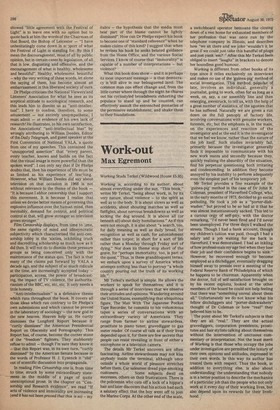Work-out
Max Egremont
Working Studs Terkel (Wildwood House £5.95) Working is, according to its author, about almost everything under the sun. "This book," writes Mr Terkel, "being about work, is, by its very nature, about violence — to the spirit as well as to the body. It is about ulcers as well as accidents, about shouting matches as well as fistfights, about nervous breakdowns as well as kicking the dog around. It is above all (or beneath all) about daily humiliations." As if this were not enough, it is also about "a search, too, for daily meaning as well as daily bread, for recognition as well as cash, for astonishment rather than torpor; in short for a sort of life rather than a Monday through Friday sort of dying." Nor does its theme stop short of the grave, for "perhaps immortality, too, is part of the quest." Thus, in these grandiloquent terms, we embark upon a survey of America which attempts nothing less than to portray "a whole country pouring out the truth of its working life."
Mr Terkel's method is simple. He allows the workers to speak for themselves; and it is through a series of interviews that we observe their attitudes and opinions. Wandering around the United States, exemplifying that ubiquitous figure, The Man With The Japanese Pocket Tape Recorder, he commits to his voluminous tapes a series of conversations with an extraordinary variety of Americans. They range from farmer to airline stewardess, prostitute to piano tuner, gravedigger to gas meter reader. Of course all talk as if their lives depended upon it, for there are few secrets that people can resist revealing in front of either a microphone or a television camera.
The details Mr Terkel uncovers are often fascinating. Airline stewardesses may not kiss anybody inside the terminal, although once outside a whole world of pleasure stretches before them. Car salesmen dread pipe-smoking customers. Some subjects dwell on successes, others on their frustrations. There is the policeman who cuts off a lock of a hippie's hair and later discovers that his action had such a salutary effect that the boy went off to join the Marine Corps. At the other end of the scale, a switchboard operator bemoans the closing down of a rest home for exhausted members of her profession that was once run by the telephone company in Illinois, and describes how "we sit there and we joke 'wouldn't it be great if we could just take this handful of plugs and just yank 'em?' " After this Mr Terkel feels obliged to insert "laughs" in brackets to denote her boundless good humour.
Working is different from other books of its type since it relies exclusively on interviews and makes no use of the 'guinea-pig' method of social investigation. This method, popular of late, involves an individual, generally a journalist, going to work, often for as long as a week, on, say, a car assembly line and then emerging, awestruck, to tell us, with the help of a great number of statistics, of the agonies that he has suffered. Naturally we are given a run down on the full panoply of factory life, involving conversations with genuine workers, foremen, etc; but the emphasis is, in the main, on the experiences and reaction of the investigator and at the end it is the investigator that we feel we know, rather than the nature of the job itself. Such studies invariably fail, primarily because the investigator generally finds it impossible to communicate with his new work mates and secondly because they, quickly realising the absurdity of the situation, find his perpetual questioning both irritating and condescending. In addition they become annoyed by his inability to perform adequately even the simplest part of his temporary job.
Mr Terkel provides a fine example of the 'guinea-pig' method in the case of Dr John R. Coleman, president of Haverford College, who, in the early months of 1973, decided to go social potholing. He took a job as a "porter-dishwasher," but proved to be so bad at it that he was almost instantaneously sacked. This led to a curious orgy of self-pity, with the doctor remarking, "I'd never been fired and I'd never been unemployed. For three days I walked the streets. Though I had a bank account, though my children's tuition was paid, though I had a salary and a job waiting for me back in Haverford, I was demoralised. I had an inkling of how professionals my age feel when they lose their job and their confidence begins to sink." However, he recovered enough to become employed as a ditchdigger, eventually dragging himself away to preside over a meeting of the Federal Reserve Bank of Philadelphia of which he happens to be chairman. Apparently when the doctor, full of self-satisfaction brought on by his recent exploits, looked at the other members of the board he could not help feeling that there was "something unreal about them all." Unfortunately we do not know what his fellow ditchdiggers and "porter-dishwashers" thought of Dr Coleman or how "real" they believed him to be.
The point about Mr Terkel's subjects is that they ' are all "real." They are the actual gravediggers, corporation presidents, prostitutes and hair stylists talking about themselves without the intervention of unctuous commentary or interpretation. Not the least merit of Working is that those who occupy the jobs under investigation are permitted the luxury of their own opinions and attitudes, expressed in their own words. In this way its author has treated them with respect. Thus the book, in addition to everything else, is also about understanding: the understanding that nobody is in a better position to describe the mechanics of a particular job than the people who not only work at it every day of their working lives, but also depend upon its rewards for their livelihood.


































 Previous page
Previous page